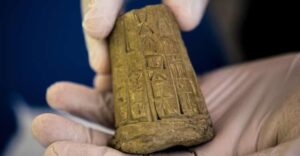
Photo courtesy of U.S. Immigration and Customs Enforcement (ICE)
The owners of Hobby Lobby, a devoutly Christian company, have been profiled during the past few years for their questionable acquisitions of historic artifacts and the lack of reputable provenance research related to those items. The problems related to their purchases were publicly aired years ago, with evidence that the company acquires looted items from the Middle East. However, earlier this year, Hobby Lobby came under government scrutiny, leading to a civil forfeiture of thousands of artifacts.
As an advocate for responsible acquisition practices, it was an honor to consult with the Eastern District of New York regarding national and international cultural heritage laws related to purchases made by Hobby Lobby. The substance of the consultation with the government is confidential, however the US Attorney’s Office has officially released some very interesting information about the case. The most distressing, and unusual, aspect of the case is the fact that Hobby Lobby actually consulted with a cultural heritage expert back in 2010. Not only did the company confer with an expert, but they chose one of the most well-respected heritage experts in the world, a woman who has devoted her career to the protection of heritage items, Prof. Patty Gerstenblith. Yet contrary to Gerstenblith’s advice, Hobby Lobby continued to acquire objects that she warned them against purchasing due to the high probability that the pieces were looted.
What is the purpose of consulting with an expert, if that expert’s advice is not followed? It isn’t simply willful ignorance, but it is willfully ignoring important information. Why were red flags disregarded? Hobby Lobby defended itself in their public statement, “The Company was new to the world of acquiring these items, and did not fully appreciate the complexities of the acquisitions process. This resulted in some regrettable mistakes. The Company imprudently relied on dealers and shippers who, in hindsight, did not understand the correct way to document and ship these items.” But that is not believable since the company had access to information from one of the world’s leading heritage experts.
Another troubling aspect of this case relates to the company’s misrepresentations related to the nature of the goods. Not only did Hobby Lobby lie about the origin of the objects on customs forms, but they also lied about the value of those pieces. Information about the value and origin of an object is “material.” 18 USC 542 deems it a crime to import goods into the US by means of false statements, while 18 USC 545 makes it a crime to smuggle objects into the US.
The circumstances in this case reveal a great deal about the greed and secrecy in the art and antiquities markets. And although the company has agreed to return the artifacts and pay a $3 million fine, the result can never reverse the negative effects from acquiring looted antiquities.
Please return to this blog in the coming weeks for an upcoming article about red flags in the art and antiquities collecting world and for information about the due diligence process for the acquisition of heritage items.
UPDATE: Leila’s piece for Artnet about some of the legal strategies behind the Hobby Lobby matter: https://news.artnet.com/art-world/why-hobby-lobby-verdict-1021247